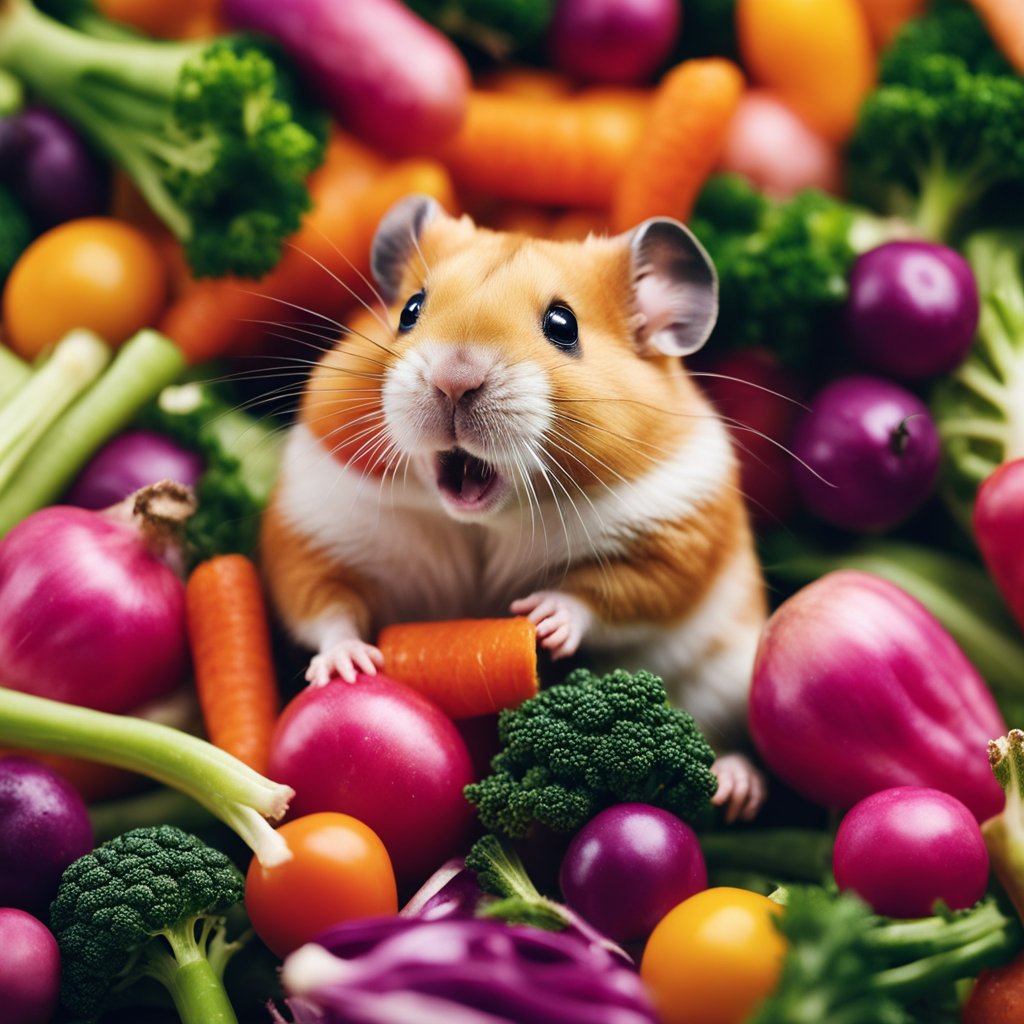What Vegetables Are Poisonous to Hamsters ? A Comprehensive Guide
As a hamster owner, you want to make sure that your furry friend is healthy and happy. One of the ways to do that is by providing a balanced diet that includes vegetables. However, not all vegetables are safe for hamsters to eat. In fact, some vegetables can be poisonous and even fatal to these small animals. In this article, we will explore what vegetables are poisonous to hamsters and how to prevent poisoning.
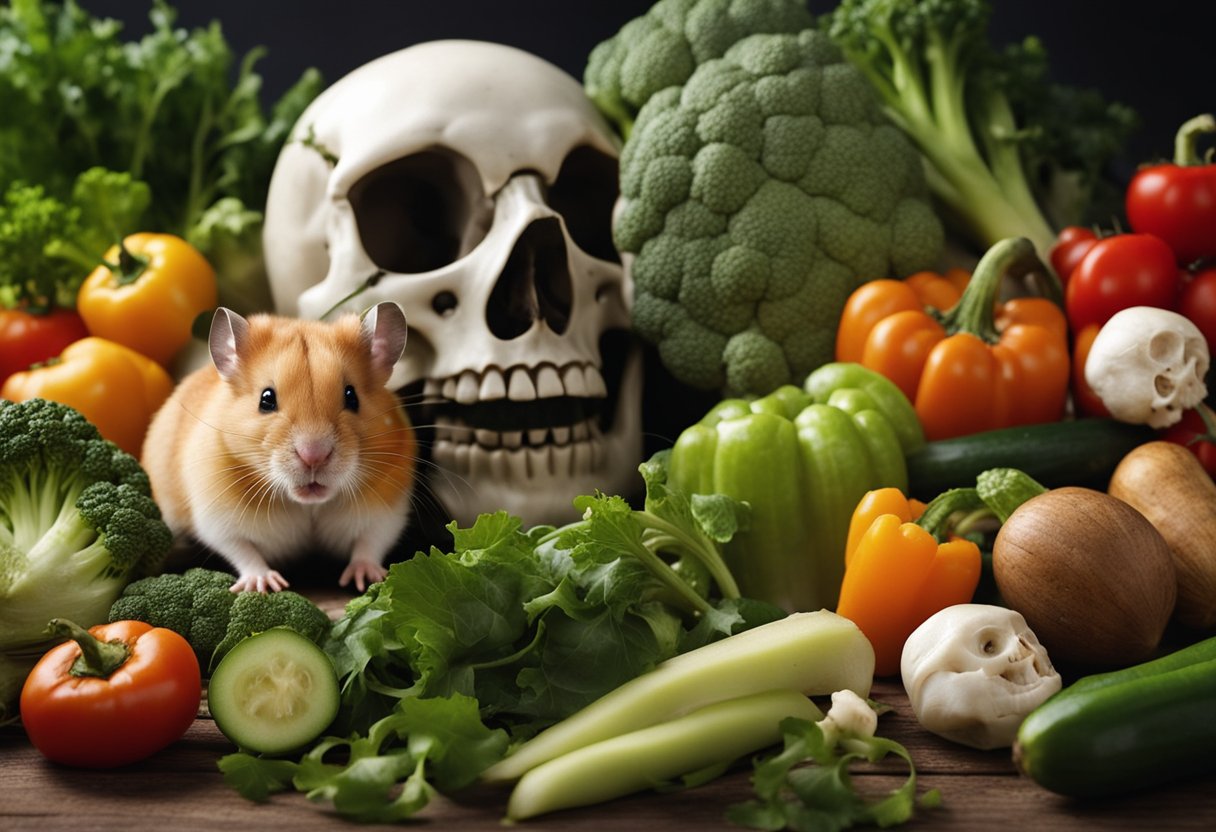
Hamsters have a sensitive digestive system, and some vegetables can cause gastrointestinal problems, such as diarrhea and vomiting. Moreover, some vegetables contain toxins that can harm hamsters. For example, raw potatoes and onions contain solanine, a toxic substance that can cause digestive upset, lethargy, and even death in severe cases. Other vegetables that are poisonous to hamsters include rhubarb, avocado, tomato leaves, and uncooked beans.
To keep your hamster safe, it is important to know what vegetables are safe to feed and what vegetables are poisonous. Additionally, you should always wash vegetables thoroughly before feeding them to your hamster and remove any seeds, pits, or stems that can be harmful. If you suspect that your hamster has eaten a poisonous vegetable, contact your veterinarian immediately. With proper care and attention, you can help your hamster live a healthy and happy life.
Key Takeaways
- Hamsters have a sensitive digestive system, and some vegetables can be poisonous to them.
- Vegetables that are poisonous to hamsters include raw potatoes, onions, rhubarb, avocado, tomato leaves, and uncooked beans.
- To prevent poisoning, always wash vegetables thoroughly, remove any harmful parts, and contact your veterinarian if you suspect your hamster has eaten a poisonous vegetable.
Common Poisonous Vegetables for Hamsters
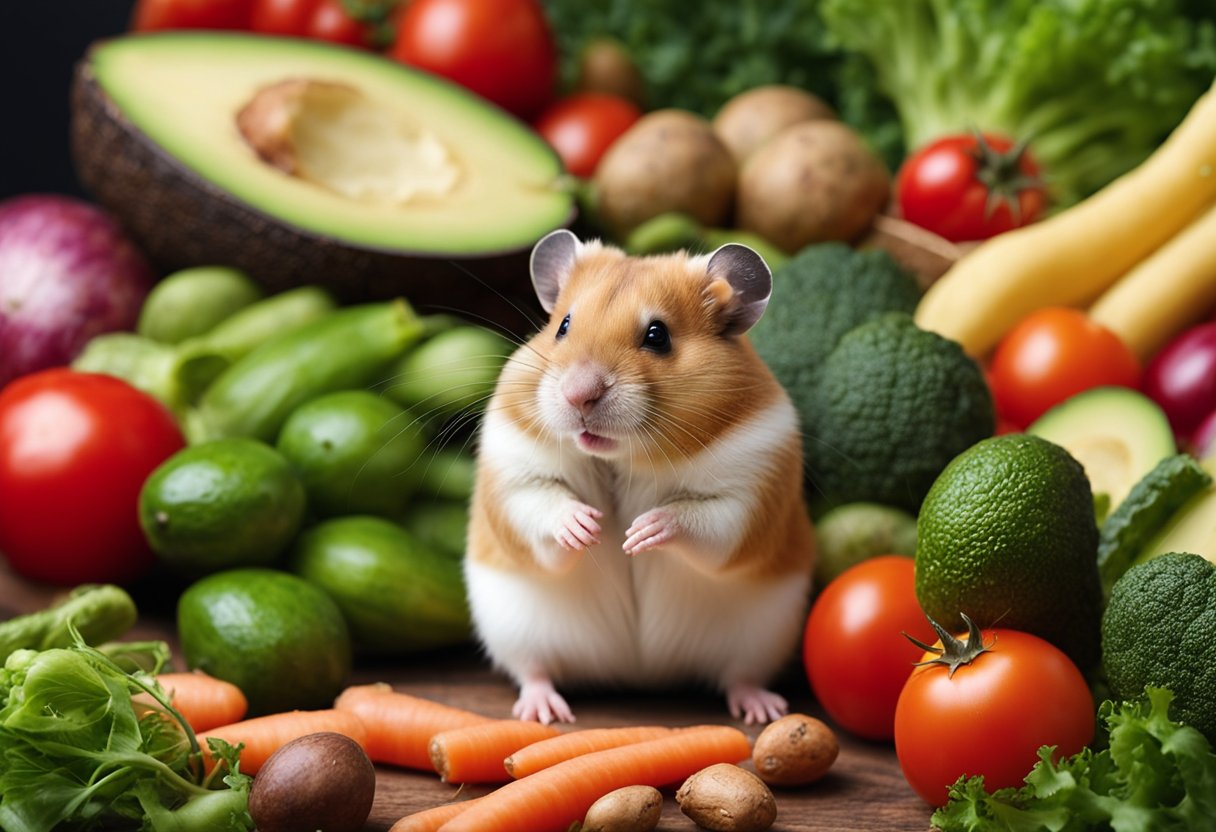
As a hamster owner, it’s essential to know which vegetables are safe to feed your pet and which ones are not. While most vegetables are safe for hamsters, some can be harmful and even toxic to them. In this section, we will discuss the most common poisonous vegetables for hamsters.
Nightshade Family Vegetables
Nightshade family vegetables are a group of vegetables that contain solanine, a toxic substance that can cause severe health problems in hamsters. These vegetables include:
- Tomatoes
- Potatoes
- Eggplant
- Peppers
While these vegetables are safe for humans to consume, they can cause digestive issues, vomiting, and diarrhea in hamsters. It’s best to avoid feeding your hamster any vegetables from the nightshade family.
Allium Family Vegetables
The Allium family of vegetables contains compounds that can cause hemolytic anemia in hamsters. Hemolytic anemia is a condition that destroys red blood cells, leading to weakness, lethargy, and even death. These vegetables include:
- Onions
- Garlic
- Shallots
- Leeks
It’s best to avoid feeding your hamster any vegetables from the Allium family.
Legumes and Beans
Legumes and beans are a group of vegetables that contain lectins, a toxic substance that can cause digestive problems and even death in hamsters. These vegetables include:
- Lentils
- Peas
- Beans
- Soybeans
While these vegetables are safe for humans to consume, they can cause severe health problems in hamsters. It’s best to avoid feeding your hamster any vegetables from the legume and bean family.
In conclusion, it’s essential to know which vegetables are safe to feed your hamster and which ones are not. Avoid feeding your hamster any vegetables from the nightshade family, Allium family, and legume and bean family. Always consult with your veterinarian if you’re unsure about which vegetables are safe for your hamster to consume.
Preventing Poisoning in Hamsters
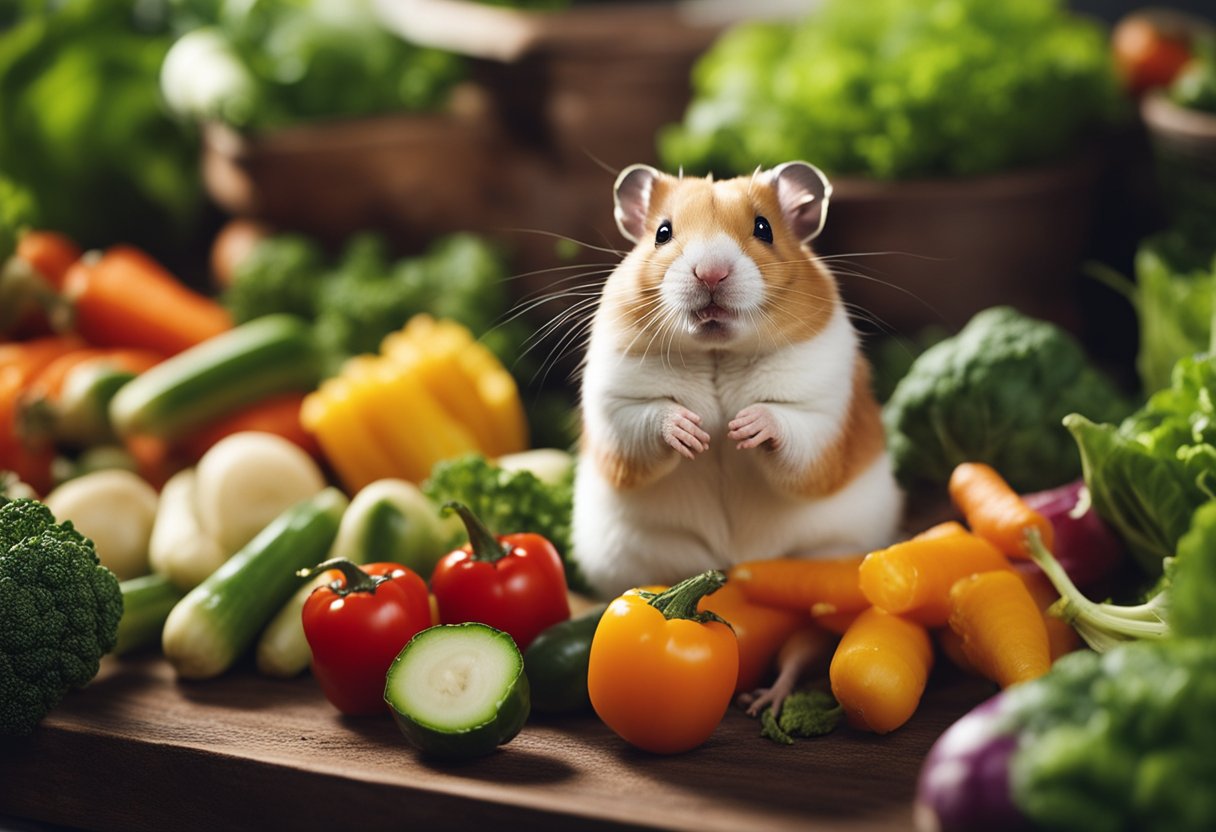
Hamsters are sensitive animals and can be easily affected by toxic substances, including certain vegetables. To keep your hamster healthy and safe, it’s important to take necessary precautions and follow safe practices when handling and preparing their food. Here are some tips to help prevent poisoning in hamsters.
Safe Handling and Preparation
Proper handling and preparation of your hamster’s food can go a long way in preventing poisoning. Always wash your hands before handling your hamster’s food to avoid contamination. Additionally, make sure to thoroughly wash all fruits and vegetables before feeding them to your hamster. This will remove any toxic pesticides that may be sprayed on them.
It’s also important to cut vegetables into small pieces to prevent choking and to remove any seeds or pits that may be toxic to hamsters. For example, apple seeds contain cyanide and should be removed before feeding apples to your hamster. You should also avoid feeding your hamster vegetables that have been exposed to mold or are past their expiration date.
Identifying Toxic Foods
It’s important to be aware of which vegetables are toxic to hamsters. Some common vegetables that should be avoided include:
- Rhubarb
- Tomato leaves and stems
- Potato leaves and stems
- Onion and garlic
- Avocado
Keep in mind that this is not an exhaustive list and there may be other vegetables that are toxic to hamsters. If you are unsure about a particular vegetable, it’s best to err on the side of caution and avoid feeding it to your hamster.
Creating a Balanced Diet
In addition to avoiding toxic foods, it’s important to create a balanced diet for your hamster. A hamster’s diet should consist of a mix of vegetables, fruits, and high-quality hamster food. This will provide your hamster with the necessary nutrients to maintain optimal health.
When feeding vegetables, make sure to offer a variety to ensure your hamster is getting a balanced diet. Some safe vegetables for hamsters include:
- Carrots
- Broccoli
- Celery
- Cucumber
- Peas
- Spinach
Remember to feed vegetables in moderation and to introduce new foods gradually to prevent digestive upset. By following these tips, you can help prevent poisoning in your hamster and ensure they live a happy and healthy life.
Resources
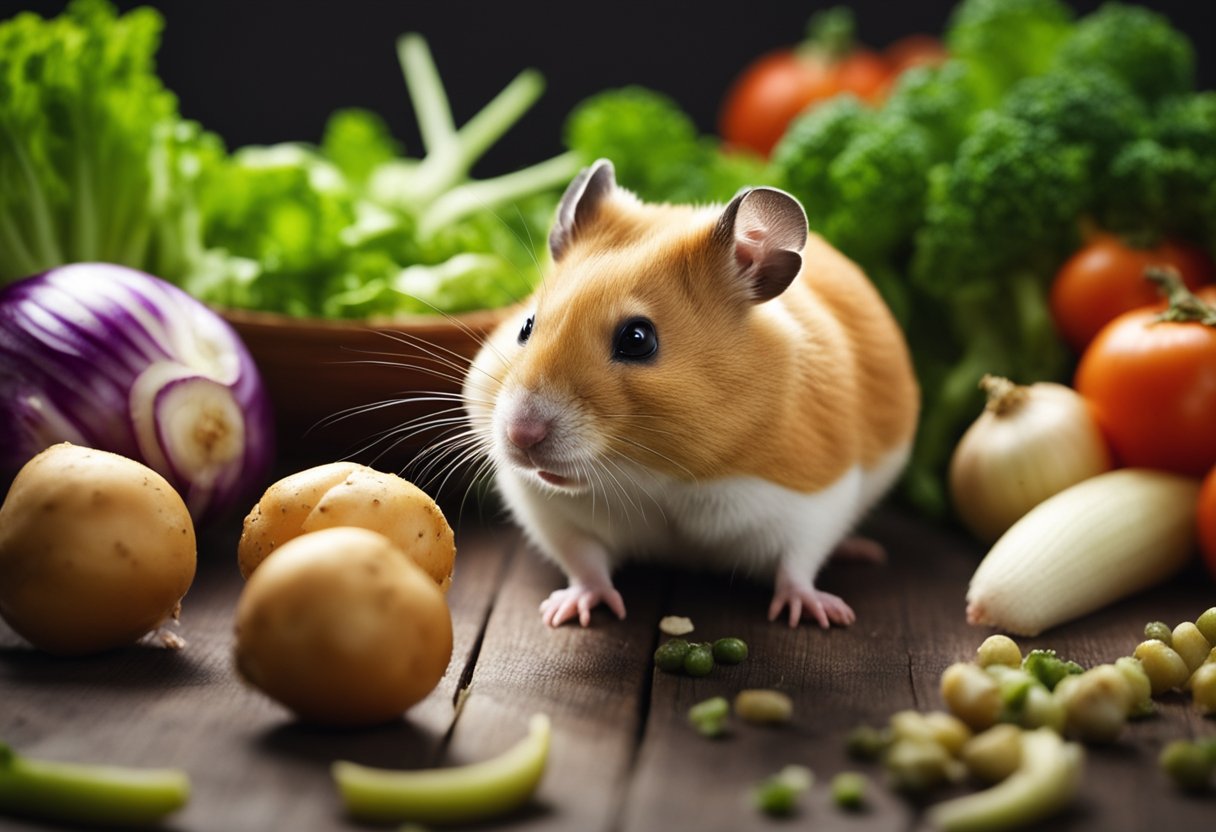
When it comes to the safety of your hamster, it’s important to be well-informed about what foods to avoid. Here are some resources that can help you learn more about what vegetables are poisonous to hamsters:
- Hamsters101.com: This website has a comprehensive list of 14 foods that are dangerous to hamsters, including bitter almonds, unwashed vegetables, and potatoes. The list also includes information about why these foods are dangerous and what symptoms to look out for if your hamster has ingested them.
- Animallama.com: This website has a safe and unsafe hamster food list for vegetables, fruits, and herbs. It provides information about what vegetables are safe for hamsters to eat and what ones to avoid. For example, green, raw potatoes contain large amounts of a toxin called solanine, so hamsters, like humans, should never eat such potatoes. Potatoes should be fed cooked, without salt or seasoning.
- The Hamster Forum: This website has a safe and unsafe fruit and vegetable list for hamsters. It provides a comprehensive list of everyday fruits and vegetables that are suitable for hamsters, in very small quantities – with exceptions. Most of this is common sense and using commonly eaten fresh food. Raw is better than cooked veg, but both are fine. (With the exception of raw potato and onion – see below).
- Fluffytamer.com: This website has information about poisonous vegetables and fruits for hamsters. It provides information about how to navigate the minefield of toxic vegetables and fruits for a healthy hamster. Hamsters, those delightful bundles of fur and energy, bring joy to many households. However, ensuring their well-being requires careful attention to their diet, as certain vegetables and fruits can pose a toxic threat to these small creatures.
By using these resources, you can ensure that your hamster stays healthy and safe. Remember to always do your research and consult with a veterinarian if you have any concerns about your hamster’s diet.
Conclusion
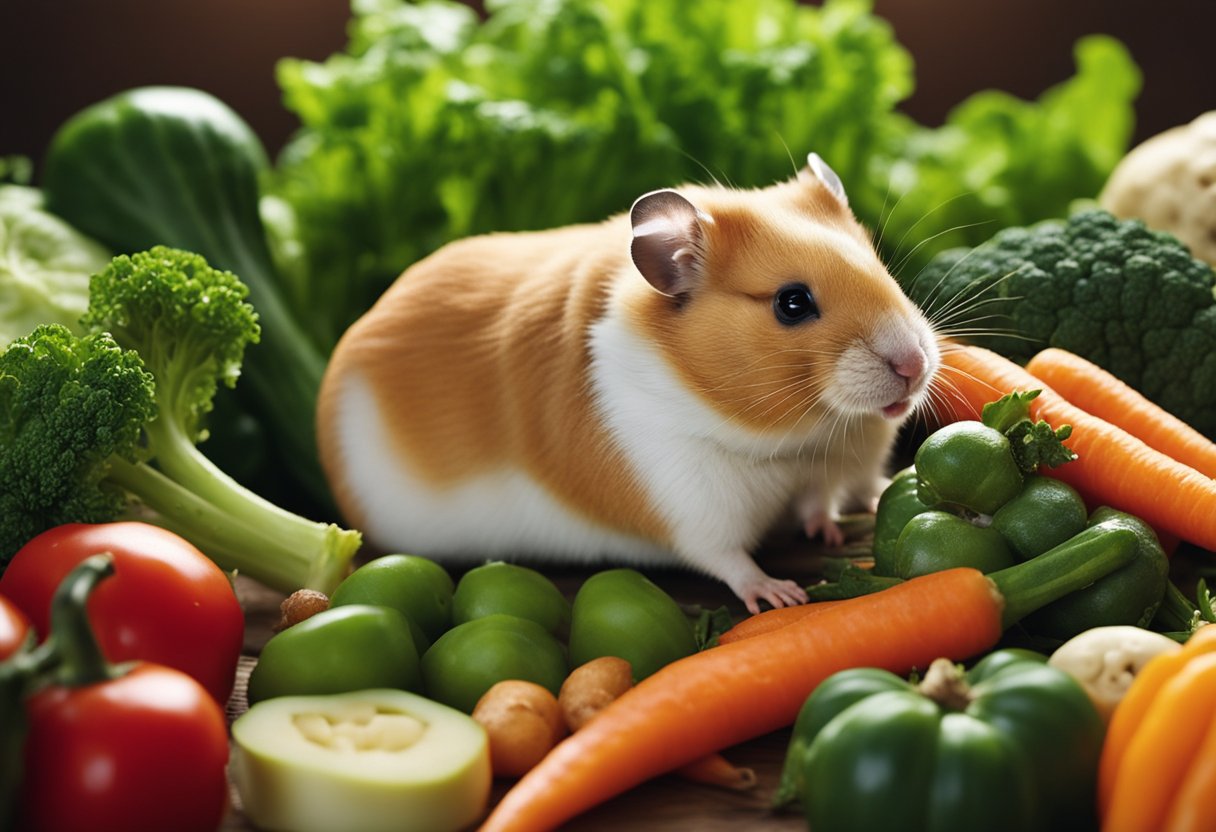
In conclusion, it’s important to be aware of the vegetables that are poisonous to hamsters and avoid feeding them to your furry friend. Always do your research and consult with a veterinarian before introducing new foods to your hamster’s diet.
Remember, a balanced diet that includes fresh fruits and vegetables is important for a hamster’s health. Focus on feeding your hamster safe and beneficial foods such as carrots, cucumber, bell pepper, and broccoli in moderation.
Be sure to avoid overfeeding and choose appropriate foods to prevent digestive problems. A well-rounded hamster diet that includes high-quality pellets, veggies, and a variety of nuts and seeds will provide the necessary minerals for your hamster’s health.
By following these guidelines and being mindful of what you feed your hamster, you can ensure that your furry friend lives a happy and healthy life.
Frequently Asked Questions
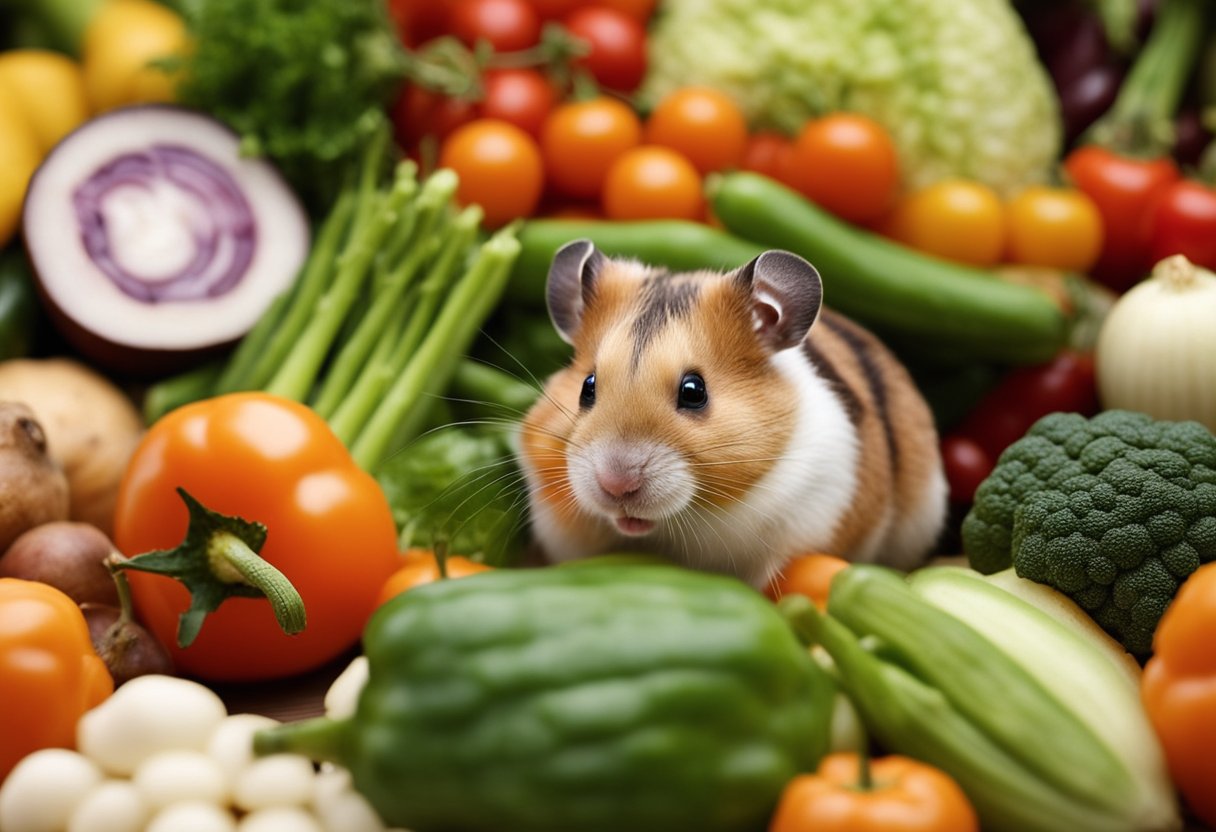
Which vegetables should be avoided in a hamster’s diet?
There are some vegetables that should be avoided when feeding your hamster. These include vegetables from the onion family, such as onions, garlic, and leeks. These vegetables can be toxic to hamsters and should be completely avoided. Additionally, rhubarb and raw potatoes should not be given to hamsters as they can cause digestive issues.
What are the toxic foods that can harm hamsters?
Some toxic foods that can harm hamsters include chocolate, caffeine, alcohol, and avocado. These foods can cause a range of health problems, from digestive issues to seizures. It is important to keep these foods away from your hamster and ensure that they do not have access to them.
Are there any common vegetables that are unsafe for hamsters?
Yes, there are some common vegetables that are unsafe for hamsters. Vegetables from the onion family, such as onions, garlic, and leeks, should be avoided. Additionally, rhubarb and raw potatoes should not be given to hamsters. Other vegetables that should be given in moderation include spinach and kale, as they contain high levels of oxalates which can cause kidney damage if consumed in large amounts.
What snacks are dangerous for hamsters to consume?
Some snacks that are dangerous for hamsters to consume include chocolate, nuts, and seeds. These foods can cause digestive issues and can also be a choking hazard. It is important to give your hamster safe and appropriate snacks, such as small pieces of fruit or vegetables.
Can certain fruits be poisonous to hamsters?
Yes, certain fruits can be poisonous to hamsters. These include citrus fruits, such as oranges and lemons, which can cause digestive issues. Grapes and raisins should also be avoided as they can cause kidney damage. It is important to give your hamster safe and appropriate fruits, such as small pieces of apple or banana.
What human foods are known to cause harm to hamsters?
There are many human foods that can cause harm to hamsters. These include chocolate, caffeine, alcohol, and avocado. Additionally, spicy and salty foods should be avoided as they can cause digestive issues. It is important to give your hamster a balanced and appropriate diet that is tailored to their specific needs.
